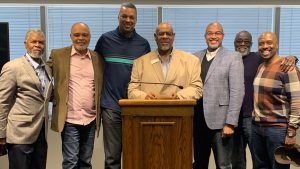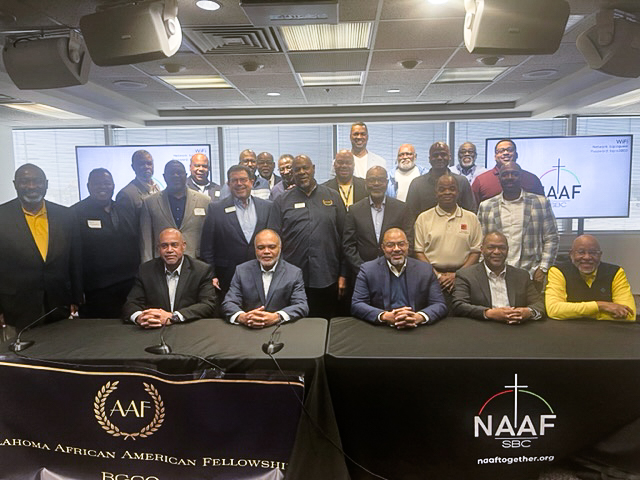Pastor David Hooks remembers the talk in Idabel when he planted a church there in 2002. People wanted to know why he, an African American, was Southern Baptist.

Walter Wilson, African American ministry partner with Oklahoma Baptists, at podium, and David Hooks, president of the Oklahoma African American Fellowship, second from right, join other African American leaders at the spring board meeting of the National African Fellowship of the Southern Baptist Convention. Submitted photo
“I had to tell the people of my church, ‘We’re not going for what we can get, we have a lot to offer,’” Hooks said. “Number one, this is where God is leading us, and I knew it was a God thing. But also, I had to make sure people understood that when we’ve got our hand out, it’s not for them to put something in it; it’s so that they can take out of our hand what we have.
“We have a lot to offer. And just in that area (Idabel), it gave us the ability to build some relationships.”
Hooks is the newly-appointed president of the Oklahoma African American Fellowship of the Southern Baptist Convention, and since 2008 has pastored Oklahoma City, Bryant Avenue, a racially-diverse congregation with a pre-COVID average worship attendance of 100.
Hooks was one of 21 African American pastors involved in Southern Baptist ministry in Oklahoma when Walter Wilson became African American ministry partner with Oklahoma Baptists in 2017.
Wilson, tasked with increasing African American involvement in the state convention, believes ethnic inclusion is a key aspect of Gospel outreach.
“You have to realize we only serve one God, and we have to do this together,” Wilson said. “God set it up that way.”
Through intentional initiatives in cooperation with other leaders, Wilson has attracted an additional 52 African American pastors. Today, 73 African American pastors are involved with Oklahoma Baptists, and perhaps five more are petitioning to join, Wilson said.
“My goal is to have 100 African American churches participating, actually participating, with the convention by the end of this year,” said Wilson, who pastors Lawton, Friendship.
Todd Fisher, executive director-treasurer of Oklahoma Baptists, appreciates the growth.
“The Lord is truly at work among Oklahoma Baptists, and one of the areas we see that is in the encouraging growth of churches connected to the Oklahoma African American Fellowship,” Fisher said. “I am deeply thankful for this godly group of pastors and leaders who are advancing the Gospel, and for my friend and brother Walter Wilson, who is doing remarkable ministry work.”
Wilson has encouraged African American participation by involving them in the work and ministry of the convention while offering initiatives that address pertinent needs.
“Inclusiveness was a big key,” Wilson said. “I planned to populate our committees and boards (with more African American males and females) … and they agreed with me, the convention did. You know, Southern Baptist life is driven by committees. We populated the boards.”
African Americans were attracted because they saw others who look like them at the table, Wilson said.
“The other part was just letting them know what we offer,” including affordable educational enrichment through the Robert Haskins School of Christian Ministry, where Wilson developed an African American educational track with Black teachers.
African Americans began seeking statewide office among Oklahoma Baptists, began attending conferences at Falls Creek, giving to the Cooperative Program and supporting more fully the work of the convention.
“Pastors started asking how they could be involved,” Wilson said.
He added that outreach during the early days of the COVID-19 pandemic—when Oklahoma Baptists worked with Southern Baptist and non-Southern Baptist pastors to set up online giving and worship—also attracted pastors.
Many need to see that the Body of Christ expands beyond ethnic boundaries, Wilson said.
“We need to let the world see that the Gospel has no color. The soul has no color,” he said. “If we are going to reside in heaven together, we’ve got to learn to work together here.
“It’s really important to me, as a pastor, and as the director of African American ministries for our convention, that they see that (while) we know there are problems out there, there are some brothers and sisters who really mean brother and sisterly love.”
Hooks is encouraging full engagement in Oklahoma Baptist life.
“We are really encouraging our churches to be involved. Because, you’ve got to be at the table, and you can’t just be at the table when there’s something for you, or you perceive there’s something for you.
“When you participate, you build relationships. You get to know people and people get to know you, and it makes all the difference in the world,” he said.
When Hooks was called to Bryant Avenue, the congregation was majority white with only three Black members, he said. Today, he describes the church as nearly evenly comprised of Blacks and whites.
“I knew God brought me there. I knew why He brought me there, and it wasn’t to turn Bryant into a Black church or a white church. It was to turn it into (what) the Body of Christ would look like, together,” Hooks said. “People come in and they look at us, and they say, this is how it’s supposed to be.”





